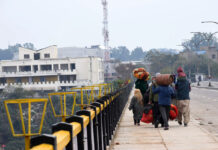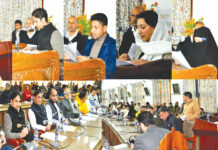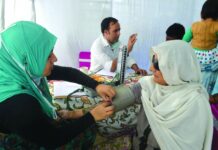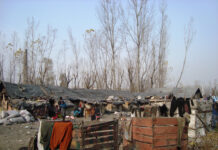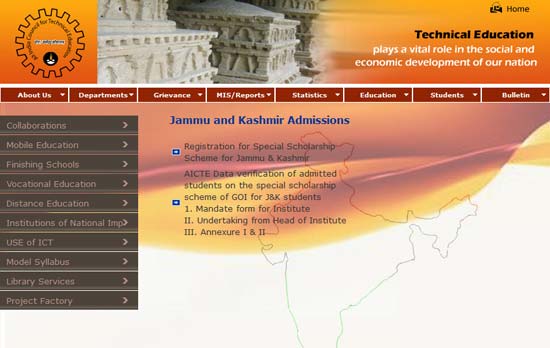 Thought Geelani says they have nothing to do with the author’s viewpoint, Jamaat is furious over the silence maintained by Geelani over the allegations leveled by Shariati in the book and “unethical style” of describing the party’s role in the last 20 years.
Thought Geelani says they have nothing to do with the author’s viewpoint, Jamaat is furious over the silence maintained by Geelani over the allegations leveled by Shariati in the book and “unethical style” of describing the party’s role in the last 20 years.
“The book has tampered with the facts as far as the portrayal of Jamaat in most unethical language. It is unfortunate that Geelani Sahab did not utter a single word against the character assassination of the Jamaat in the book,” says Sheikh Mohammad Hassan, Amir-i-Jama’at.
“We have offered numerous sacrifices for the nation and still were bracketed as Indian agents by Mr Shariati which is a reversal of truth. We highlighted the disputed status of Kashmir years before militancy erupted in the state and had been languishing in jails for doing so and on this count also Geelani Sahab wore cloak of silence,” he says.
Geelani on the other hand maintains that everyone has a right to express his or her views and people and parties have to exhibit patience to criticism. “I have gone through the book and I found nothing new in it as all had been already published in media and books. I did not find anything objectionable in the book to take the issue to press,” says Geelani. “There were two points which I do not approve. Shariati says taking part in elections and the alliance with ideologically incompatible parties were wrong decisions. We did take part in election but did nothing wrong, so we are satisfied. The words in the book are Shariati’s own and he has a right to criticize,” says Geelani.
Sheikh finds some tacit understanding in the ubiquitous praise of Geelani throughout the book. “Dr Shariati has written foreword for Geelani Sahab’s book ‘Iqbal: Rooh-i- Deen Ka Shinasa’ and will definitely have some understanding with Geelani Sahab. Whether Geelani Sahab deserves it or not is not our concern. We expected him to break the ice of silence which he did not,” complains Sheikh.
However, Geelani dismissed any prior understanding with the author on this book. “I sincerely tell you that I have read the book only after it was released. I did not know anything about its contents; neither had we (the author and Geelani) any understanding beforehand,” says Geelani adding that “I do not want this to turn into a debate of allegations and counter allegations.”
Meanwhile, the author of the book remains a mysterious figure, as he has neither come forward, nor is anything written about him on the book. The book identifies its publisher as Shariati Publications.
Thought Sheikh and Geelani are fighting in his name, both have little to say about his identity. “I know him by the foreword (of Iqbal: Rooh-i- Deen Ka Shinasa) and nothing more than that,” says Sheikh.
“He is a Ph.D holder with a great deal of knowledge,” tells Geelani.
The row has for now lead to Geelani’s suspension from the party, though not for the first time.
The party has always been in crisis after 1999, but the summer of 2000 witnessed slinging matches between Geelani and the then Amir Jamaat (head) Ghulam Mohammad Bhat. Geelani took a strong exception to Bhat’s “unauthorized” support to Hizb ul Mujahideen ceasefire and bracketed him with the Indian Prime Minister and the then chief minister Dr Farooq Abdullah. The party’s 24-member Majlis-e-Shoora took four days to listen to the two sides. Eventually the patch-up led to a moderate becoming Geelani’s deputy and a hawk becoming Bhat’s aide. Geelani continued representing Jamaat in the undivided Hurriyat.
Bhat’s ascent to the coveted position in Jamaat came at a time when the party was facing music for being the backbone of the Hizbul Mujahideen. Unlike Geelani who, according to party sources, wanted the party to own Hizb, Bhat wanted to salvage the party from the mess and get it back to its socio-political activities.
At one point of time, Hizb was termed as the armed wing of Jamaat and it had its own positive and negative impact on the party and the cadres. Fathering the most powerful indigenous militant outfit gave Jamaat access to authority at the peak of chaos and a berth on the local chessboard but its enormous costs devoured over 2000 of its frontline activists.
This apparently was the main motivation for public dissociation of militancy from activism. Bhat made public announcements twice to this effect and Hizb leader Syed Salahuddin endorsed it from Muzaffarabad. However, Bhat’s consistent and unconditional support to all the moderate voices and vibes annoyed Geelani. The dichotomy continued. Never ever was Geelani permitted to become the president of the party and no successor of Bhat toed Geelani’s line fully.
Exactly a year after the face-off with Bhat, Jamaat President Nazir Ahmad Kaashani in 2003 sent Geelani on retirement from the “active service” along with many others. The decision had paved way for the Hurriyat to get another Jamaat leader as Geelani’s replacement but it did not take place as Ashraf Seharie, who was tipped to head its political bureau refused the assignment.
The attention then shifted towards the Hurriyat where Geelani wanted punishment for Peoples Conference that had fielded proxy candidates and continued to be part of the alliance. A no-confidence motion was moved in Hurriyat and Molvi Abbas Ansari was ousted and the alliance divided in September 2003. Masarat Aalam led the move. Geelani supported the idea but said he was out of the process. Efforts of a rapprochement failed and a few days later Geelani announced setting up of a ‘rival’ Hurriyat.
It was the issue of support from Jamaat that triggered another dose of problems between the two sides. Geelani expected the Jamaat to become the member of his Hurriyat but the party wanted to stay equidistant while helping to mend fences between the rival Hurriyats. Relations heated up in March 2004 after the clergyman Kaashani issued notices to a number of senior functionaries accusing them of making efforts to float a new party at the cost of Jamaat. The suffocation and the dictatorial policies of the party, as Sehrai put it, had forced them to set up a separate party. But the cadres intervened. They rushed to Geelani’s Hyderpora residence and prevented announcement of a new entity in July 2004.
But it could not be prevented for long. After washing dirty linen in public for a long time, the warring factions finally managed a way out in August 2004. Majlis-e-Shoura, permitted Geelani to float a separate political party for “settling Kashmir issue through effective but peaceful means” that Jamaat would support. Apart from offering its members for deputation to the new party, Jamaat would also join his Hurriyat. The new party Tehreek-e-Hurriyat-e-Kashmir was launched within days and most of its members had dual membership. The decision was the only way-out for preventing an imminent split.
Everybody wanted the doves and hawks to survive happily after the deal but things in the right-wing groups do not necessarily follow the scripts. In June 2006, Kaashani blocked Geelani and his five lieutenants from trying to contest the elections for various office bearers including president. Referring to the Shura, Kaashani said they all are enjoying dual membership. If they do not resign from Tehreek-e-Hurriyat, they cannot be part of any policy making body or permitted to seek mandate for any position in the party. The decision did not help Kaashsani to get re-elected as he was replaced by Sheikh Ghulam Hassan, a leader who was summoned back from his retirement to lead the party.
After the biography was out, it is the turn of Geelani versus Sheikh Ghulam Hassan.


